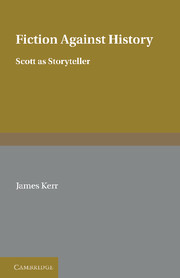Book contents
- Frontmatter
- Contents
- Acknowledgements
- A note on citations of the Waverley novels
- 1 The historical novel and the production of the past
- 2 The reemplotment of rebellion: Waverley and Old Mortality
- 3 Historical fable and political fantasy: The Heart of Midlothian and The Bride of Lammermoor
- 4 Redgauntlet: the historical romance as metafiction
- Notes
- Index
4 - Redgauntlet: the historical romance as metafiction
Published online by Cambridge University Press: 28 January 2010
- Frontmatter
- Contents
- Acknowledgements
- A note on citations of the Waverley novels
- 1 The historical novel and the production of the past
- 2 The reemplotment of rebellion: Waverley and Old Mortality
- 3 Historical fable and political fantasy: The Heart of Midlothian and The Bride of Lammermoor
- 4 Redgauntlet: the historical romance as metafiction
- Notes
- Index
Summary
Some five years after writing his nightmare vision of historical change in The Bride, Scott returns in Redgauntlet to the problems of representation he had first touched on in Waverley, and which he had made the dominant issue of Old Mortality, Here again, the immediate subject of the novel is an unsuccessful rebellion. But Redgauntlet is about a rebellion that never occurred. By eliding the historical referent he had supplied in the earlier novels, Scott shifts the emphasis of his writing, to a greater degree than ever, towards the processes of making historical narrative. He makes the fact of the novel's fictionality its defining feature, not simply underscoring his own contrivances, but using his “romantic history,” as his young lawyer Alan Fairford would have it, of the Redgauntlet family as the pretext for an elaborate study of his own methods as historian and romancer.
The amiable and detached commentary on his own fictions we find in Waverley, the demystifying thrusts and playful self-parodies of Old Mortality, are incorporated in Redgauntlet into Scott's deceptively casual remarks on the power and limitations of his fictions as instruments for grasping the movements of history. In Waverley, Scott's reflections on his procedures of depicting the past are contained within the narrative itself, stated directly in brief discursive passages and implicitly in Scott's handling of various representational devices – pictures, letters, gazette reports. History is defined as the effect available to the reader through a series of distances, accessible only at a multiple remove, through the mediating forms of legends, romances, family histories.
- Type
- Chapter
- Information
- Fiction against HistoryScott as Storyteller, pp. 102 - 123Publisher: Cambridge University PressPrint publication year: 1989

